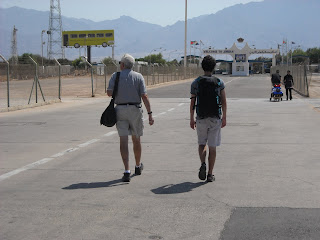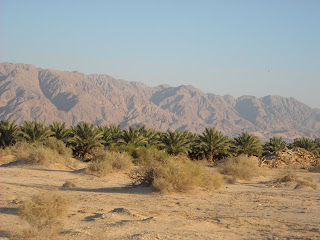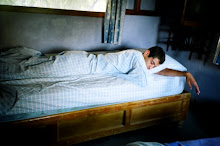My dad and I just got back from a two-day trip to the Golan, a region in the northeastern corner of Israel. This area was captured by the Jews only four decades ago in the Six Day War and its ownership has been a matter of conflict with neighboring Syria ever since (Its Wikipedia page is even
disputed). We had booked a tour in a small bus that carried us around to a handful of different cities and sights, from our home in Tel Aviv to a Kibbutz at the most northern reaches of Israel where would spend the night. Then, today we hit another set of points on the way back.
Our first stop was in the city of Nazareth (yes, of "Jesus of Nazareth" fame). This was also our first stop that had made an important appearance in the New Testament. It would not be our last, as it seems JC had booked the same tour with Israeli World Tour Group just two millennia ago, hitting all the same locations. For every place where the Bible says anyone committed any deed, there is a church built on top of that place, and in some places there are two or three churches that all claim to be built on top of that place. Not only that, but every church is not the original church, because every few centuries it gets knocked down in a war, so they pool money from Christians all over the world to build a new church on the ruins of the old.
Here in Nazareth, there is a well at which Mary was getting some water when she was told by the angel Gabe that she was pregnant with God's kid. So, inside this giant church there is a hole cut in the ground and there is the well. Christians from the Argentina to Zimbabwe are snapping pictures, praying, and buying postcards.
Next door is another church. This is where Joseph had his carpentry workshop. I think it was underground in a cave because we kept looking down this hole in the ground. I'm not sure really why he would have built furniture underground, but our tour guide just kept saying, "In the Christian tradition, Joseph worked in this cave...," like he was not going to admit its truth, but he wanted to explain why billions of people still thought it was true, even though it might look completely ridiculous to the heathens in the group. This church was called St. Joseph's. My dad and I wondered what Joseph had done to become a saint. We agreed that any guy who believes his virgin wife when she comes home and says she is going to have a baby, but it's okay because it's God's, was probably a saint.
We then stopped at a series of churches at places where Jesus had committed miracles, like the church of the stone where he stood to make bread and fishes for an entire community and the church outside the old synagogue where he brought back to life the daughter of a Roman soldier. It wasn't even lunchtime before I was getting warn out by the deadly combination of piety and humidity. I would say, however, one very interesting aspect of all these sites is that they never just represent one group, but really each site is an amalgamation of at least three. Some places will have a mosque built on top of a church built on top of a Roman palace built on top of a synagogue. (And to think it's heavy that the Bay St. shopping mall is built on top of an Ohlone Shellmound!) Also, this means that at every gift shop you can see menorahs and crucifixes sitting next to each other on the shelf. If only, religious harmony could exist as well in people as it does in trinkets.


It is hot as hell (bite your tongue!) and I'm wondering why so much blood has been shed for this land while California sits miles away at a cool 70 degrees 365 days a year. But as we head further north, the golden brown of the desert that has been the theme color for every inch of this country starts to turn green. In the winter, they say it snows here. Tell that to my dehydrated camel. We drove through the Hula Valley, which looks a lot like Napa with big orchards stretching to the hills.

The word
peaceful might have floated in my head just as we drove up to the town where we would spend the night, but it was only fleeting. We stopped at a memorial for some of the first Jewish soldiers to die fighting the Arabs for this land in the 1920's. Only steps away was a smaller, more makeshift memorial for Israeli paratroopers who had been hit by a rocket on this spot just two years ago in the Second Lebanese War. There were a group of soldiers that had stopped by in there trucks to look. This was a very real example of how constant and immediate the fighting still is in this country.

We were just a few kilometers from the border of Lebanon. Since going to Eilat a week and a half ago, I had now successfully traveled the entire length of Israel.
We spent the night at a hotel run by a Kibbutz called Kfar Gil'adi. This was one of those privatized kibbutzim, for sure. No commies here. Indoor pool, TV in every room, and an amazing buffet shown here:

On our trip back we surveyed the area known specifically as the Golan Heights. Until 1967, Syrian troops used to shoot down at Jews in the valley from its strategically significant higher ground. Once it became part of Israel, Jews began to quickly settle and cultivate the region. There are rumors that the Israelis might give this region back to Syria in exchange for a peaceful border (similar to the one in Jordan), which would provide tourism for both countries through easy passage, as well as other considerations. However, there are cities like Katzrin, which was constructed completely within that short time period and already has about 8,000 people and very well could be Lafayette. The Israelis can build civilization like no other. My dad tells me that the Chinese have even hired them to start building cities from scratch in China. You could have a plot of barren land, but give it to the Israelis and it will have a shopping mall and a post office in no time. The reason for building like this is obvious. They are trying to settle the land to show that is Jewish. In some respects it is very good. I like visiting clean, well-organized cities, and their efficient use of the land's resources is incredible. However, this makes it very hard, when say, you might have to give the land back to another country in order to sign a peace agreement. This is true all over this country. Everywhere I go, I am surprised, yet very comforted by the Jewish cities. It is all very Western. But I can't help thinking that there is a back end to this. Is someone losing out, where the Israelis keep winning?
Tomorrow we are going to Jericho. This is one of the big cities in the Palestinian-occupied territories. I have only driven through the West Bank's peripheral regions, so this will be my first true glimpse on the other side of the wall. I felt if I was going to be in this country for 19 days I might as well see a place like this.
































